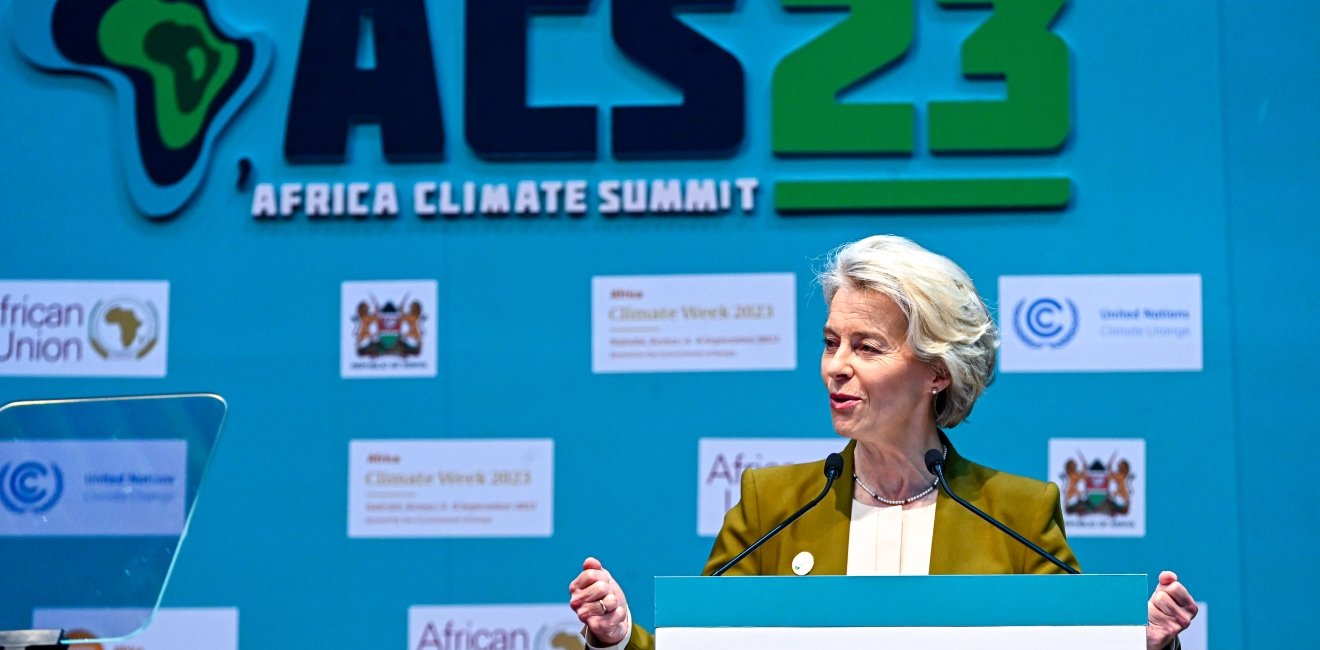At the start of its new five-year institutional cycle, the EU faces a rapidly changing external environment. The bloc’s 2024-2029 strategic agenda acknowledges the unprecedented challenges, ranging from the battle against climate change to global conflicts. To be capable of handling the challenges of the future, the EU seeks to establish a greener and more sovereign Europe. Yet, overlapping a green transition with a strategically autonomous Europe remains a challenge across European capitals. In his confirmation hearing on November 7, European Commissioner for Climate Action Wopke Hoekstra acknowledged the tension between the EU’s net-zero goals and European competitiveness. Aligning the two concepts requires the EU to de-risk, or avoid too much dependence on one provider, for its green ambitions. A so-called green strategic autonomy framework would require the EU to use climate diplomacy to leverage the EU’s climate leadership to develop new partnerships that improve the bloc’s autonomy. Specifically, the EU can align its green ambitions with promoting green tech and climate investment in Africa to shape a foreign policy that will advance a green, sovereign Europe.
Autonomy in a Challenging Environment
Since taking its permanent place in the EU lexicon in 2016, ‘strategic autonomy’ has been at the forefront of European foreign policy. Initially defense-focused, the challenges of the 2020s transformed strategic autonomy into an all-encompassing concept for a resilient Europe. The COVID-19 pandemic, for example, exposed the vulnerabilities of Europe’s global supply chains. Russia’s decision to cut off energy exports to European countries further emphasized how reliant the EU is on third parties for critical goods and materials. These dependencies impact the EU’s ability to act autonomously as long as adversaries can exploit such critical vulnerabilities. This issue is not going unnoticed within the EU. In June 2023, the European Commission and High Representative released the European Economic Security Strategy, recognizing how Europe’s economic linkages can present security concerns. Yet the EU lacks the natural resources to homeshore critical supply chains. As such, any strategy to establish a more autonomous Europe requires a foreign policy aimed at reducing major dependencies by strengthening its partnerships and diversifying its supply chains.
Reducing major dependencies while greenifying Europe’s economy is no easy feat. Europe’s decarbonization goals require a shift to green technologies. Here, all roads lead to Beijing. China dominates the green technology industry at the moment. Over 80 percent of global solar module production occurs in China. Similarly, 77 percent of EV batteries are made by Chinese producers. De-risking such dependencies means the EU will need to find ways to diversify its green technology portfolio. This requires a renewed orientation towards Africa.
As such, any strategy to establish a more autonomous Europe requires a foreign policy aimed at reducing major dependencies by strengthening its partnerships and diversifying its supply chains.
The Case for Climate Diplomacy
To achieve its green agenda and reduce its dependencies, the EU needs to deepen partnerships within the developing world, and Africa in particular. While China serves as the world’s largest green energy producer, African countries are identifying their strategic opportunities in the green tech movement. Not only do 90 percent of critical minerals needed for renewable energy generation come from Africa, various African countries such as Kenya are becoming a hub for green energy development and green tech start-ups. The strategic importance of Africa in advancing the green industry is not going unnoticed. The United States and China increasingly seek opportunities to deepen their ties with various African countries. Yet both powers neglect to invest in one area of critical importance to these countries: climate change.
While the developed world works to climate-proof their own economies, African countries are often left behind. Debt-level sustainability limits African countries’ ability to fund national climate plans. The continent’s combined foreign debt exceeded $1.1 trillion at the end of 2023. Kenya – a country that experienced deadly protests this summer following tax measures to address debt issues – exemplifies these issues. Kenya’s debt-to-GDP ratio increased from 37 percent in 2010 to 68 percent in 2021. Recent hikes in interest rates only compound these problems. Countries such as Kenya increasingly accumulate more debt to pay off existing debt, leaving less money available to invest in climate plans. This makes external financing all the more important for Kenya to meet its climate goals. Kenya’s 2020-2030 climate plans require $54 billion of the estimated $62 billion to come from external funding. While Kenya has successfully attracted major green tech investments for various projects, the World Bank estimates the country still experiences a $5 billion gap in its annual climate budget. As climate-related investments from the U.S. may experience changes under a new White House administration in 2025, the continued availability of climate funds and partnerships such as the U.S.-Kenya Climate and Clean Energy Industrial Partnership is uncertain. This provides the EU with an opportunity to step up.
The EU can work with countries like Kenya by aligning goals to establish mutually beneficial partnerships. Kenyan President William Ruto best summarized these opportunities during his speech at the European Parliament in November 2023, where he remarked on the role Africa can play in creating a greener resource-mining industry, driving green industrialization, and linking the EU’s climate ambitions with those of African countries.
Establishing Partnerships
Climate diplomacy begins with identifying ways to establish win-win partnerships. This requires the EU to view climate change through the eyes of its intended partners. Too often, European climate policies cater to European net-zero goals. Climate-related policies such as the Carbon Border Adjustment Mechanism (CBAM) – imposing a tax on carbon-intensive production imported into the EU – neglect the realities of developing economies relying on carbon-intensive production or raw materials. Instead, establishing mutually beneficial climate partnerships requires the EU to understand and acknowledge the different non-Western capabilities in battling climate change without impacting the economic development of partner countries.
From this understanding, the EU can align its geopolitical objectives with targeted climate investments. Beyond mere development aid, the EU must work with and invest in African countries to spur African industrialization in line with climate goals. Specifically, climate investments need to be unlocked. EU funds such as the Global Gateway are a good first step. But more is needed. The EU can simultaneously help African countries address their need for investment and debt sustainability through mechanisms such as debt-for-climate swaps. Such swaps would provide countries like Kenya with a debt-relief mechanism that unlocks capital for climate-proofing the economy.
Establishing mutually beneficial climate partnerships requires the EU to understand and acknowledge the different non-Western capabilities in battling climate change without impacting the economic development of partner countries.
Beyond public investments, the EU can spur private investment into the opportunity-rich African climate markets. Africa offers a potential $2 trillion climate adaptation market. Yet private investment accounts for just 1.6 percent of adaptation finance. Europe’s knowledge and experience with public-private partnerships can help reduce the uncertainty and risks keeping companies at bay. Organizations such as the European Investment Bank can set up blended finance mechanisms to create thriving green technology industries in Africa. Such mechanisms would help private companies reduce the upfront financial burden of investing in volatile green tech industries, making green industry ventures more profitable. In turn, these industries can help African countries tap into their full green energy potential by creating regional green technology value chains rather than outsourcing production to China. To this end, the EU can leverage various fora already in existence to stimulate dialogue and action between Europe and Africa such as the ministerial meetings under the Africa-EU Partnership and the EU-Africa Business Forum.
Green Strategic Autonomy?
As the EU exits the first summer of its new institutional cycle, climate diplomacy presents the EU with an opportunity to align two of the Union’s most pressing challenges. Equitable partnerships within Africa would spur the EU’s global decarbonization goals. At the same time, advanced green industries in Africa would help the EU diversify critical supply chains to reduce dependencies. A green Europe does not have to interfere with the goal of an autonomous, more sovereign Europe. It simply requires the EU to act more strategically. By deepening partnerships within Africa the EU can develop the ties it needs to act autonomously without worrying about potential shocks in energy supply lines or climate technology imports from China. Climate diplomacy may not solve all of the EU’s autonomy or supply chain issues, but it paves the way to stronger partnerships.
Author


Global Europe Program
The Global Europe Program is focused on Europe’s capabilities, and how it engages on critical global issues. We investigate European approaches to critical global issues. We examine Europe’s relations with Russia and Eurasia, China and the Indo-Pacific, the Middle East and Africa. Our initiatives include “Ukraine in Europe”—an examination of what it will take to make Ukraine’s European future a reality. But we also examine the role of NATO, the European Union and the OSCE, Europe’s energy security, transatlantic trade disputes, and challenges to democracy. The Global Europe Program’s staff, scholars-in-residence, and Global Fellows participate in seminars, policy study groups, and international conferences to provide analytical recommendations to policy makers and the media. Read more

Explore More
Browse Insights & Analysis
360° View of How Southeast Asia Can Attract More FDI in Chips and AI





